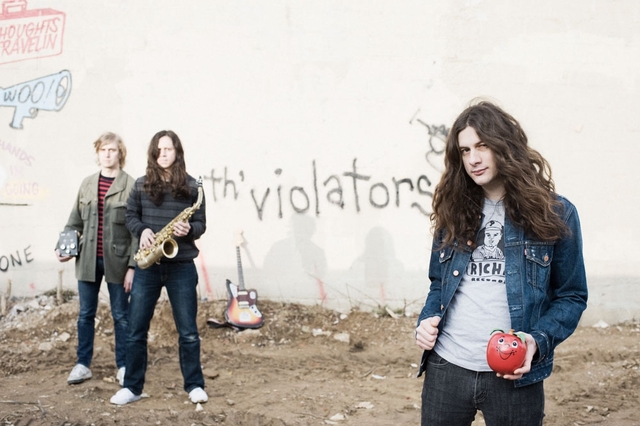Kurt Vile probably doesn’t have a heart of gold. He might be a freewheeling ’70s-era rock revivalist with a penchant for interjecting with “you know” and “man” a lot. Whatever he is, it’s hard to deny the endearing profundity of Vile’s demeanor—whether he’s waxing poetic about his love of music or talking about how he’s a changed man since becoming a father. Maybe it’s this type of sincerity that has made him a household name in the indie rock world. It’s an attribute that Vile may not be completely comfortable delving into, but he’s definitely up for singing about it.“I guess it’s all interesting to me. What I love is playing music, and I’ve played the game to find out every facet, little by little,” Vile said. “The music business is like a big wonder. Every step is kind of exciting: to find out things or even get into the office of the record label you grew up listening to. And they’re talking to you and you don’t believe it at first, and you accept it and add it to strengthen your ego or have fun with it or something. I don’t know. [Laughs.]”Vile was raised in Philadelphia, Pa., and started playing music as a teenager. Growing up in a big family, Vile was one of 10 siblings. Musing about whether his family was “musical,” Vile said his father was into bluegrass and bought him a banjo when he was 14. Coming of age in the early ’90s, Vile was into artists like Pavement and Beck, but he also paid homage to the greats who came before, notably Creedence Clearwater Revival and Neil Young. If you ask Vile who his inspirations are, he can go on and on. What makes Vile interesting is his relentless pursuit of the perfect song. As a recording artist, Vile is always writing music and continually coming up with new ideas. “It’s just like a DNA thing,” Vile said. “Everybody has something they’re meant to do. I just have the bug. I can’t say why. It’s just what I’m into.”Perhaps part of the reason Vile’s music maintains a sense of sincerity is because he is constantly on the lookout for meaning in his everyday life. Whether he’s spending time with his family and eating schnitzel or reading a good book, he’s always on a quest for something that will not only enlighten him but will also strike a nerve.“I did an interview, and I said I was looking for something profound and American to read next. Then somebody texted me and said I should read [Cormac McCarthy’s] Blood Meridian. I had tried to read his other book that’s pretty famous, The Road, and it was just a little too bleak for me. It was good—just not my style,” Vile said. “I like books that are explosive and you can’t put it down, like [the work of] Bret Easton Ellis. That’s why I picked up The Great Gatsby—because I wanted something profound, classic and American—but I’m looking forward to moving toward my generation or just a little before. But we’ll see about Blood Meridian.”It’s easy to picture Vile with guitar in hand, and it’s even easier to imagine him out on the open road. His music is imbued with a sense of freedom percolating beneath ambient riffs. Compared with past releases like Constant Hitmaker and Childish Prodigy, Vile has taken to writing longer narratives (particularly on his latest record’s first single, “Wakin On A Pretty Day”). It makes sense because Vile lives to experiment with sound to create his own landscape. What sort of landscape? That depends on the road that lies ahead. It serendipitously coincides with desert sentiment—which we Burqueños are familiar with—and it’s not a stretch to imagine his music being used to score a film. “I like that idea in general—of any kind of show business,” Vile said. “I like the idea of [working in] film, you know. … Totally, I’m into that. I know a couple people who do film in an artful way, and there are idols that I would love to—like Jim Jarmusch, that would be great. But yeah, I’m into that for sure; I’m into the whole, well-rounded show business sphere. [Laughs.]”Since Vile became a dad, he has no qualms about sharing how his life has changed significantly: from abandoning the rock star lifestyle (not that he was overwhelmingly privy to it from the get-go) to using his daughter in a promo for the new record. Some people may think he’s lost some of his mojo or that his heart has turned to mush. But Vile is keen on keeping his inspiration fresh and using his day-to-day life as a catalyst for excelling at songwriting. His passion for sound manifests even when Vile is merely talking about music … which he can do for days on end.“I’ve always maintained a certain style, but all your surroundings and the people you care about do affect you,” Vile said. “And they’re all over this last record and the one before that—like when I first started recording Smoke Ring [For My Halo], I just had my wife, and [we] had a baby on the way. And when I had the kid, I just started writing songs to my first daughter, just through my subconscious. I even wrote that song ‘In My Time’ and that other song, ‘Too Hard,’ that made it onto my next record. You change as a person with the people around you.”











